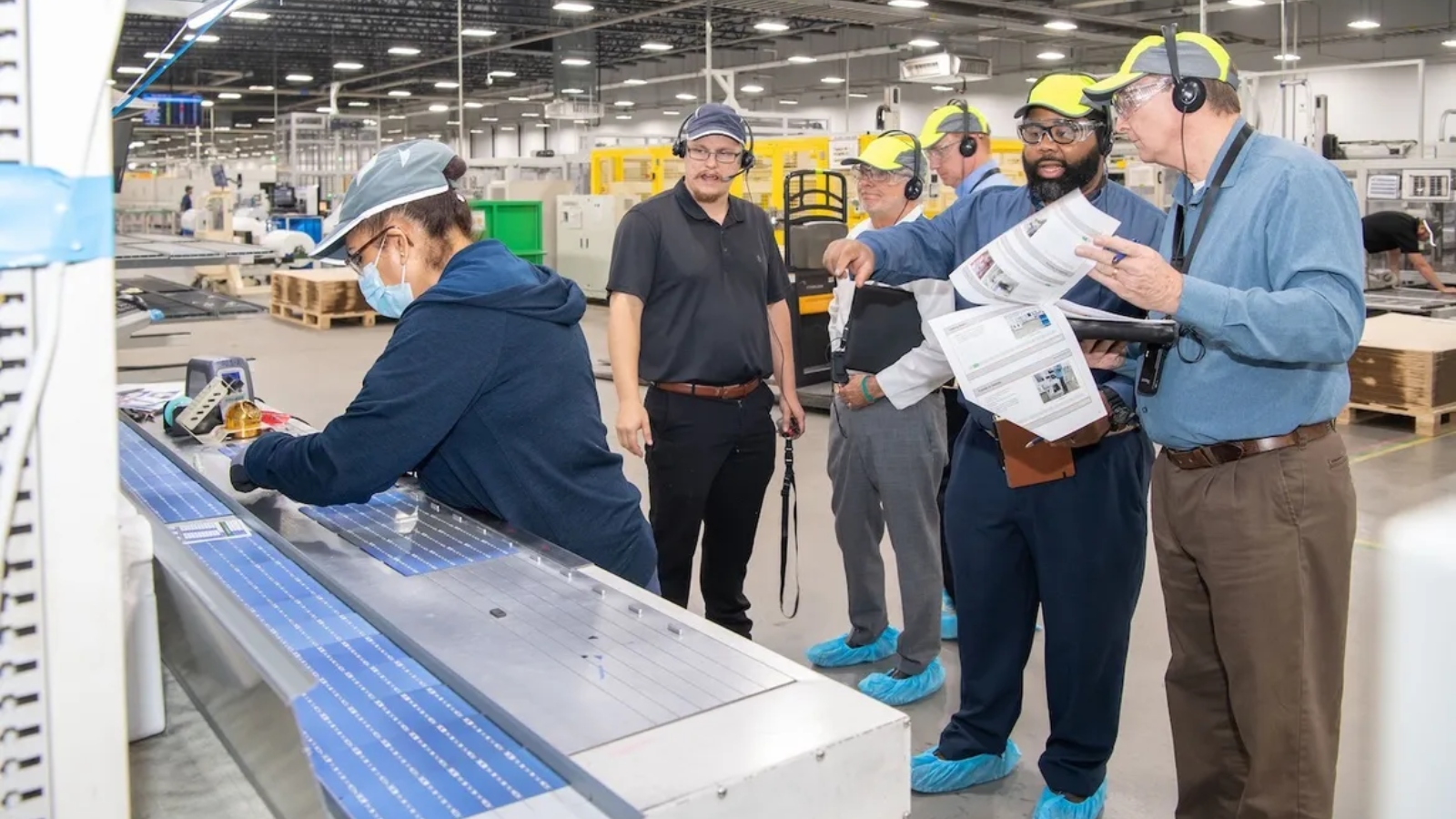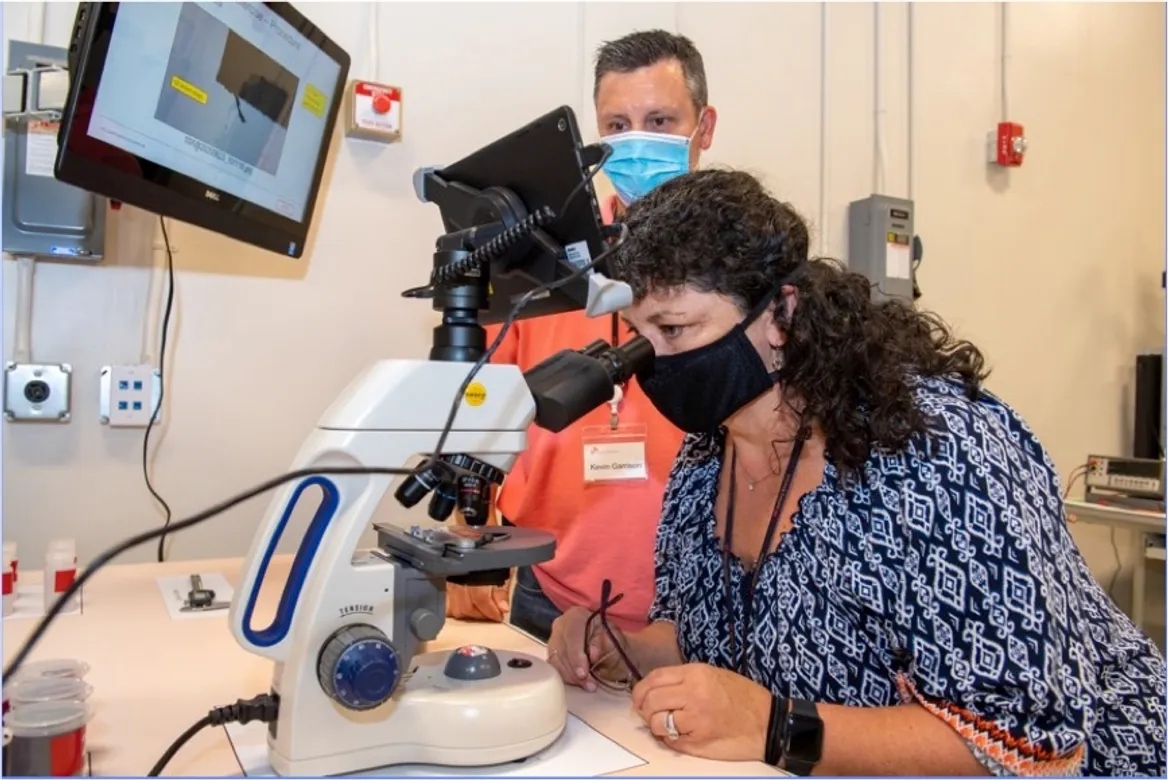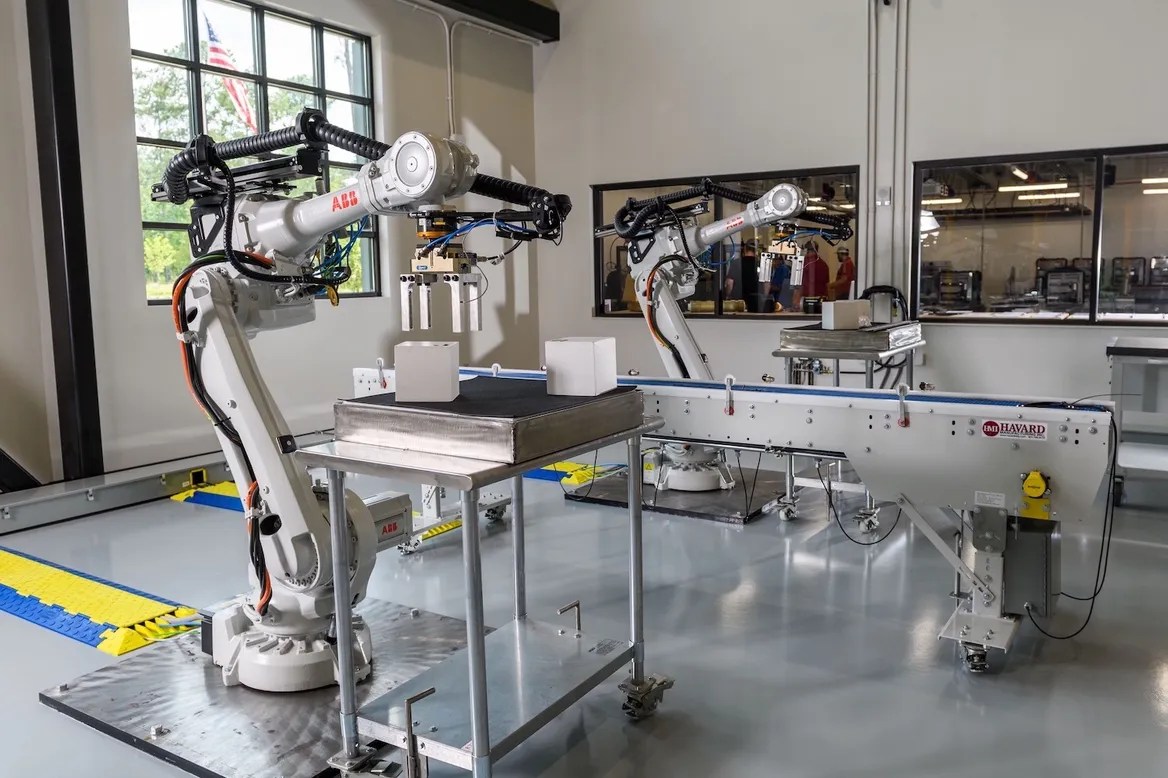This story was originally published by Canary Media and is reproduced with permission.
Robert Howey has worked at the Hanwha Qcells solar manufacturing plant in Dalton, Georgia since it opened in 2019. But like many of the factory’s other employees, he used to work in a completely different industry: carpet manufacturing. The Qcells plant is located in what Georgians affectionately call “the carpet capital of the world.”
For two years, Howey was a creeler, knotting together rolls of yarn, so that as one roll finished getting fed into the weaving machine, the next could seamlessly follow.
Before Howey started at Qcells, “I had no idea about solar,” he said. He was hired to be a “tabber operator” on the production line, where his role would be to watch over machines that solder silicon wafers together, an early stage in the making of a solar module. But he didn’t understand how his particular task fit into the overall process, which made him uncertain about how to do his job well. “I was really nervous about it,” he told Canary Media.
Georgia Quick Start, a state-funded workforce training program, gave him the guidance he needed. In a week of on-ramping, trainers walked him through all the steps of making a solar panel, instruction that gave him the confidence to start his new career. Quick Start, he said, was “a lifesaver.”
What is Georgia Quick Start?
Clean energy manufacturing in the U.S. is poised for explosive growth; the Inflation Reduction Act of 2022 will infuse more than $47 billion in the buildout of clean energy technologies and spur an estimated 900,000 manufacturing jobs over the next decade. But for that ramp-up to be successful, hundreds of thousands of workers like Howey will need training and reskilling.
Georgia Quick Start, which provides customized job training for companies free of charge, has a track record of tackling that challenge — and could serve as a model for other states preparing their workers for jobs in clean energy manufacturing.
Quick Start was founded in 1967 with the goal of attracting manufacturers from northern Rust Belt states to Georgia in order to diversify the state’s agriculture-based economy, according to Rodger Brown, executive director of Quick Start. The program was designed to prepare a workforce accustomed to seasonally dependent, sunup-to-sundown farm labor to industry’s regimented 8-hour workdays.

Georgia Quick Start
Over the following decades, Quick Start steadily grew to serve a broad range of industries. By the 1980s, for example, the program was training workers for automobile manufacturer Ford Motor Company and aircraft companies Lockheed Corporation (now Lockheed Martin), Boeing and Gulfstream Aerospace Corporation. In the 1990s, it scaled up to serve the booming carpeting industry around Dalton, Georgia.
Today, Quick Start continues to train workers for jobs in these industries as well as for ones in the manufacturing of food, pharmaceuticals, medical devices, vinyl flooring — and, increasingly, clean energy technologies such as EVs, solar panels and batteries.
A division of the state’s technical college system, Quick Start has achieved national recognition for its effectiveness. A panel of experts surveyed by Area Development Magazine has named it the top state workforce development program in the country for nine years running.
Since its founding, the program has helped prepare more than 1.8 million Georgians for new jobs, according to Brown. Now, it’s applying much of that accumulated know-how to training workers entering the clean energy manufacturing workforce. Clean energy companies and their suppliers currently make up the majority of Quick Start’s clients, Brown said. And he expects that trend to continue, with companies bringing billions of dollars to the state and growing fast:
- Rivian is investing $5 billion in an EV plant in east Georgia with plans to hire 7,500 workers.
- Hyundai Motor Group is investing $5.5 billion in an EV and battery plant and has plans to hire 8,100 employees.
- SK Battery America, which since 2019 has invested $2.6 billion in two Georgia manufacturing plants to provide lithium-ion batteries for EVs, including the Ford F-150 Lightning, has so far created 2,600 jobs and aims to add 400 more.
- Qcells, the top supplier of U.S. solar panels, announced in January that it’s investing $2.5 billion to expand its operations and build its own solar panel supply chain — from ingots to modules — in Dalton and Cartersville, Georgia, creating 2,500 new jobs.
Cleantech companies are setting up shop in Georgia for many reasons — generous tax incentives and the fact that Georgia is a “right-to-work” state with legislation that weakens labor unions are certainly among them. But Quick Start is also a big part of the equation.
The program was a major factor for Qcells, said Lisa Nash, the company’s senior director of human resources. Quick Start developed training materials for the South Korean manufacturer’s first U.S. plant in Dalton, the one Howey was hired to work in, which meant “we didn’t have to invest the thousands of hours of making classroom and video training that was necessary to get this factory started,” Nash said. That was “a game-changer for us.”
Steven Jahng, director of external affairs of South Korea–based SK Battery America, echoed those sentiments in Site Selection’s 2023 Workforce Guide: “The key incentive for SK Battery is the Georgia Quick Start program. They know exactly how to train the average person off the street.”
Retaining new workers
Like most advanced manufacturing facilities, factories that produce clean energy technologies are filled with powerful, highly automated machines and robots. Even a single wrong move, such as tripping a sensor that starts a machine whirring when it should stay off, could be dangerous.
In its weeklong Qcells training course and subsequent follow-up sessions, Quick Start teaches new hires how to stay safe, including requirements from the federal Occupational Safety and Health Administration. That’s hugely important, said David Uribe, who started working as a Qcells equipment technician in February.

Georgia Quick Start
New employees could be straight out of high school or coming from service roles at McDonald’s or Walmart, said Uribe, who has been a mechanic for decades. “It’s a big difference working with machines that could potentially kill you.”
By acclimating people to this unfamiliar environment, Quick Start training actually helps retain new workers, said Howey, the former tabber operator who is now a training coordinator at Qcells. He estimates that he was seeing about four out of 10 newly hired Qcells employees who didn’t receive Quick Start guidance dropping out “because they were overwhelmed.”
But with Quick Start, only one or two out of 10 new hires quit — “if that,” Howey said.
A recipe for success
One reason Quick Start is so effective is because it tailors trainings to the needs of each company it works with, said Brown, the program’s executive director. To begin, it closely studies every detail of a company’s manufacturing process.
For example, to develop training for SK Battery, a team of instructors flew to South Korea in 2019 to observe the company’s facilities firsthand. “We took photographs and video, and took lots of notes and asked lots of questions,” Brown said. “It’s very rare to be allowed that kind of access.”
Based on that deep dive, Quick Start, which has 75 full-time staff members, designed a training program for the company’s U.S. operations within months. As soon as SK Battery had recruited employees, Quick Start was able to begin training them, covering core modules on safety and SK Battery’s process, as well as providing job-specific training.
Quick Start’s trainees are able to gain direct, hands-on experience before they even step onto the factory floor. In 2019, the program opened a 50,000-square-foot facility in Savannah so that trainees can practice using advanced-manufacturing equipment, including automated robotics, sensors and programmable logic controllers, which are computer systems for industrial processes.
As it trains clean-energy workers on its equipment, Quick Start has been able to draw from its decades of experience with other industries, Brown said.
For example, part of the lithium-ion battery production process involves slurries of graphite, cobalt, nickel and other metals, which are mixed in enormous vessels that are similar to those used in food manufacturing to mix milk, salt and sugar. Workers monitor and troubleshoot the vats in the same way, he said.
It’s not all technical training, though, Brown noted. Quick Start also develops trainees’ soft skills, offering programs in leadership training, data-driven process improvement methods (such as Six Sigma), and with Korean companies such as SK Battery and EV manufacturers Hyundai and Kia, “cross-cultural training, like different work and communication styles.”
Another factor in Quick Start’s success, according to Brown, is that it’s wholly state-funded.

Georgia Quick Start
Federal dollars “come with a lot of reporting and strings and complexity,” he noted. Quick Start, by contrast, can adapt quickly to train workers however needed, he said.
“If you’re creating 1,000 jobs, we will train them until you have 1,000 people qualified and working in your plant — whether that means we only train a couple of hours and they go into the facility, or we do 60 hours,” Brown said. “As long as [a company is] creating net new jobs, we will be their training partner.”
Federal funding does have its advantages, of course: It sends “a lot of dollars to programs that are absolutely necessary,” said Cynthia Finley, vice president of workforce strategy and innovation at the Interstate Renewable Energy Council, which has developed trainings for a multitude of clean-energy jobs, including in solar and energy efficiency.
Federal funding opportunities can funnel much-needed money to underserved communities or groups, such as women or veterans. And because it requires quantitative benchmarks of success, Finley said, “You know you’re moving the needle.”
What’s clear is that Quick Start is able to grow rapidly to meet the demands of the clean energy boom. The program, which currently operates five training centers, is expanding the one for advanced manufacturing and is also designing three new facilities for clean energy manufacturers and suppliers.
One of those training centers will be a $70 million facility for Hyundai in Bryan County, where the EV manufacturer has committed to the single-largest economic development project in Georgia’s history. Hyundai broke ground on its new plant last October and is slated to open in January 2025, starting with a few hundred workers and, over the next several years, growing to more than 8,000.
Once its new center is ready, Quick Start plans to train about 300 to 400 new Hyundai hires a week, Brown said. When companies need to go fast, “we go fast.”
This story is part of Canary’s special series “Made in the USA: Ramping up clean energy manufacturing.” Read more.

